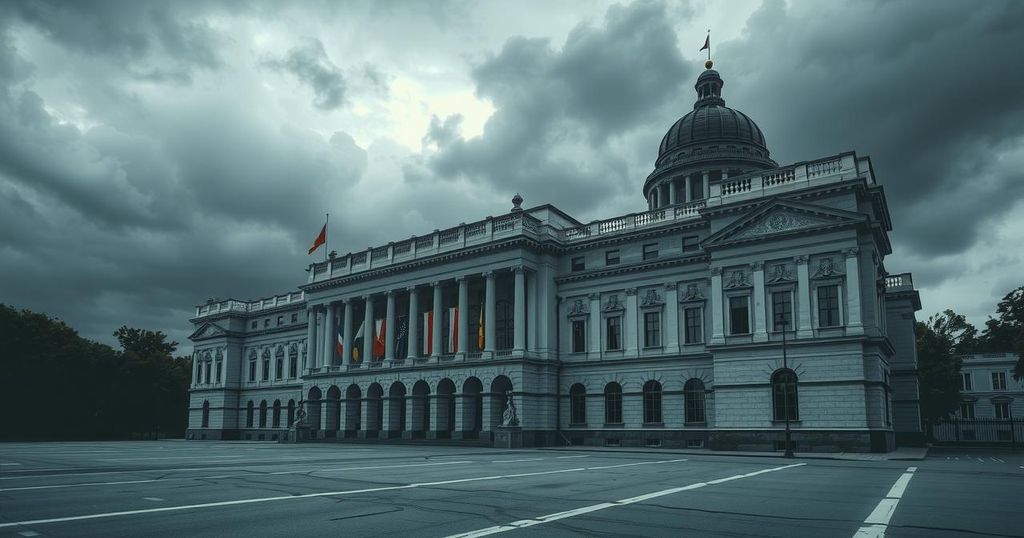Politics
AFRICA, ASIA, BREITBART, COURT OF JUSTICE, DEMOCRACY, DEPARTMENT OF INTERNATIONAL RELATIONS AND COOPERATION, DISCRIMINATION, HUMAN RIGHTS, INTERNATIONAL COURT OF JUSTICE, ISRAEL, JUDICIAL REFORM, MARCO RUBIO, NORTH AMERICA, RASOOL, RUBIO, SOUTH AFRICA, TRUMP, U. S, UNITED STATES, WASHINGTON
Jamal Walker
0 Comments
U.S. Expels South Africa’s Ambassador Amid Rising Tensions
The United States has expelled South Africa’s ambassador, Ebrahim Rasool, amid rising tensions characterized by accusations of racism against Trump. Secretary of State Marco Rubio indicated that Rasool was “no longer welcome” following critical comments made by Rasool during a webinar. This incident highlights significant deterioration in U.S.-South Africa relations due to aggressive critiques of South Africa’s land policies and broader domestic political contexts.
The United States has expelled Ebrahim Rasool, South Africa’s ambassador to Washington, due to accusations of being a “race-baiting politician” with hostility towards the U.S. and President Trump. Secretary of State Marco Rubio announced on March 14, 2025, that Rasool was “no longer welcome in our great country,” signaling a marked decline in relations between the two countries as tensions escalate since Trump’s return to office.
Rasool’s dismissal follows remarks made during a webinar hosted by a South African think tank, wherein he described Trump as a leader of a white “supremacist” faction. This characterization incited outrage from U.S. officials, particularly Rubio, who highlighted Rasool’s comments in a repost from the right-wing outlet Breitbart. The precarious state of bilateral relations can be traced back to Trump’s administration, notably his aggressive criticisms of South Africa’s land expropriation policies aimed at correcting historical racial injustices.
The critiques regarding these land policies have drawn intense scrutiny, as Trump has alleged without substantial evidence that South Africa is “confiscating land” and mistreating certain demographic groups. Analysts, including Patrick Gaspard, a former U.S. ambassador to South Africa, suggest that Rasool’s expulsion and the current tensions represent the most strained point in U.S.-South Africa relations since Trump’s election.
In response to the expulsion, the South African presidential office expressed regret over the incident, stressing the importance of maintaining diplomatic ties with the U.S. Chrispin Phiri, the spokesperson for the Department of International Relations and Cooperation, indicated that the South African government would seek diplomatic channels to remedy the situation. This incident occurs amidst increasing U.S. criticism regarding South Africa’s land expropriation law and its legal actions against Israel at the International Court of Justice.
Rasool, an esteemed politician and anti-apartheid advocate, previously served as ambassador from 2010 until 2015 and returned to the role in January 2025 during President Biden’s administration. Following the announcement of his expulsion, Rasool stated he looked forward to returning to South Africa regret-free, showcasing resilience shaped by his extensive political experiences.
In the webinar, Rasool voiced his views on the ramifications of Trump’s administration for Africa, suggesting that Trump is “mobilizing a supremacism” while pushing “white victimhood” narratives amid demographic shifts in the U.S. These statements have sparked divided opinions, with some interpreting them as a sincere critique of American politics and others deeming them an overreach of diplomatic norms.
South African President Cyril Ramaphosa deemed the expulsion “regrettable,” noting Rasool’s significant contributions prior to this incident. While some South African officials have classified Rasool’s conduct as a breach of diplomatic etiquette, they view the incident as an “isolated event” that should not overshadow future relations.
In the United States, bipartisan support for Secretary Rubio’s actions has emerged; Senate Foreign Relations Committee Chair Jim Risch endorsed Rubio’s statements as appropriate. Rasool’s comments reflect a broader context of increasing scrutiny on diplomatic relationships influenced by U.S. domestic politics.
As the discontent continues, Rasool’s past involvement in politics adds another layer of complexity to the controversy. His childhood under apartheid shaped his activism, which culminated in imprisonment during protests against the regime. His connections to historical figures like Nelson Mandela highlight his deep integration in South African political narratives.
As South Africa navigates the repercussions of Rasool’s expulsion, supporters, including long-time friends and activists, have defended him, claiming that his critiques of U.S. policies stem from a genuine concern for socio-political realities. They argue that the targeting of Rasool may be influenced by his advocacy for Palestinian rights and his Muslim identity, suggesting multifaceted layers construct this diplomatic incident.
The U.S.-South Africa relationship, rooted in a history of shared struggles against colonialism and injustice, now faces new uncertainties. Experts in international relations suggest that rebuilding trust between the two nations will necessitate nuanced dialogues and an openness to addressing the underlying tensions that define this recent diplomatic crisis.
The expulsion of South Africa’s ambassador, Ebrahim Rasool, reflects heightened tensions between the United States and South Africa, fueled by political disagreements and accusations. As relations continue to deteriorate, particularly under the Trump administration’s policies, the incident underscores the complexities and sensitivities inherent in international diplomacy. Moving forward, there is a pressing need for both nations to engage in constructive dialogue to alleviate the strain and foster a more amicable relationship.
Original Source: evrimagaci.org




Post Comment